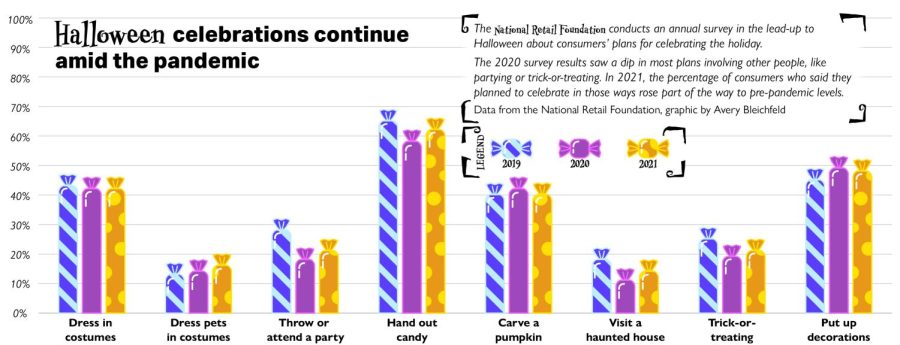Op-ed: Pandemic protocols shouldn’t put limits on Halloween celebrations
Data visualization by Avery Bleichfeld
It’s important that we return to Halloween the way it was prior to COVID-19.
October 30, 2021
Conflicts between public health and personal freedom began emerging prominently during the COVID-19 pandemic. As Halloween approaches, it’s important to consider whether certain gatherings are safe given the presence of the coronavirus. According to the Centers for Disease Control and Prevention, or CDC, trick-or-treating is allowed as long as participants take proper safety measures. However, going to parties, the organization says, isn’t advised.
With that being said, are we really supposed to go back to trick-or-treating as college students? As a disclaimer, I think that trick-or-treating is fantastic entertainment for children, but not for grown college students. So, what are college students left to do? They can’t go trick-or-treating, but they could — and should — be able to party. Researchers claim that the pandemic has hit its peak, with cases dropping every day. Public health and safety should always be a priority, but if people are fully vaccinated and exhibit no illness-related symptoms, then they should be able to attend large gatherings on Halloween.
Parties have long been a facet of college culture in the United States. As most colleges became co-educational starting in the 1920s, parties emerged as networking events, and college party culture has constantly been evolving ever since. In the late 1940s, after the Second World War, soldiers returning from the front lines to attend school increased the frequency of partying. Fast forward to the 1960s, the sexual revolution and increased class diversity of students helped partying become less shackled by school administrations. Nowadays, group gatherings are not completely banned — after all, it’s inevitable that people gather for all kinds of purposes. This leads to us discussing whether Halloween parties are advisable given the current state of the world. Given all the stress, college students need socializing activities to escape from reality, if only for a little bit. Inevitably, those who argue for continued social restrictions are bound to rally against parties during Halloween. But according to Talbott Recovery, partying is an effective way for students to beat stress. We can always find alternative drinks to alcohol, thus avoiding getting drunk at parties. And now, serving as the catalyst to people’s stereotypical subjectivity on partying, advice from the CDC against people going to parties will only bring more negativity toward party culture.
A positive example is the upcoming Halloween party held by the Chinese Students and Scholars Association, or CSSA, at Brandeis University. It’s a nonprofit party that is free for Northeastern University students to attend. According to the activity list, they have Casino Night game sets which come with prizes, free snacks, milk tea, individual custom shows and a dance show by G-Power Dance Crew. This activity is held under the approval of the university, and sets a perfect example of a “healthy Halloween party.” Yes, some might still worry about students exposing themselves to COVID-19 at events like this and at functions involving alcohol. Again, if you are fully vaccinated and do not exhibit symptoms associated with sickness, then you should be able to have fun during Halloween. Remember, wearing a mask is always an option for indoor activities. It’s the essential step to cut off the spread of virus physically, protecting both ourselves and those who we have fun with in the parties.
Social gatherings during holidays like Halloween are helpful and important for many students after they close their textbooks for the day. We should all be aware of the potential risk of going to these parties, but students’ college experience and their mental health should not be forgotten.
Tim Zhao is a first-year journalism and political science major. He can be reached at zhao.shengh@northeastern.edu.







